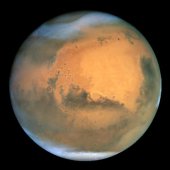
Worksheets and No Prep Teaching Resources
Reading Comprehension Worksheets
Solar System

Solar System
 Worksheets and No Prep Teaching Resources Reading Comprehension Worksheets Solar System |
 Solar System |
| edHelper's suggested reading level: | grades 3 to 5 | |
| Flesch-Kincaid grade level: | 3.42 |
|
Mars
By Cindy Grigg |

|
 1 Mars is the fourth planet from the sun. It is 141 million miles away from the sun. It has two moons. A year on Mars is 687 Earth-days long. One day is about the same as on Earth: 24.25 hours long.
1 Mars is the fourth planet from the sun. It is 141 million miles away from the sun. It has two moons. A year on Mars is 687 Earth-days long. One day is about the same as on Earth: 24.25 hours long. |
Create Weekly Reading Books
Prepare for an entire week at once! |
| Leave your feedback on Mars (use this link if you found an error in the story) |
 |
Solar System
|
 |
Science
|